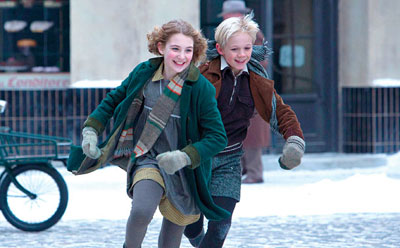
The movie is about a girl adopted* by a German couple during World War II. Based on a best-selling novel of the same title, the movie tries hard to tell what writer Markus Zusak has to say, but the result is a rushed* conclusion, with a tear-jerking* climax*.
The title character is Liesel. With blond* hair and big, sad eyes, actress Sophie Nélisse well plays the character of a girl given up for adoption shortly after her brother dies. When Liesel’s on-the-run* Communist mother can no longer care for her, she’s taken in by Hans (Geoffrey Rush) and Rosa (Emily Watson). The child soon bonds with* her new father, a smiling musician who calls Liesel “your majesty.” Rosa is cold and looks for excuses to yell*.
Although she often picks up lost books, Liesel can’t read or write, and that makes her a punch line* at school. But the girl fights those who laugh at her. After Hans teaches her to read, Liesel’s world begins to grow.
In this small German village, she finds reasons to be happy thanks to a friendship with another child, Rudy (Nico Liersch), but she also comes to understand the saddest part of Third Reich* rule, after a man named Max comes to the family’s door one night.
The son of Hans’ old friend, Max is Jewish and on the run, and he ends up hiding in the family’s basement*.
There is plenty here to create both an emotional* climax and some suspense*. But the film is lost in a number of other subplots.
That being said, the film has its pleasures, thanks to the performance of its cast*. From the opening scene of a train running through a snowy landscape, the film has a sleekness* to it.
Just as Max makes the reality easier to accept for Liesel, the movie does the same for its viewers. That leads to a PG-13 rating and a broader audience, of course. But when sad things are sugarcoated*, you can’t expect the audience to feel as deeply touched as they could be.(SD-Agencies)
|

